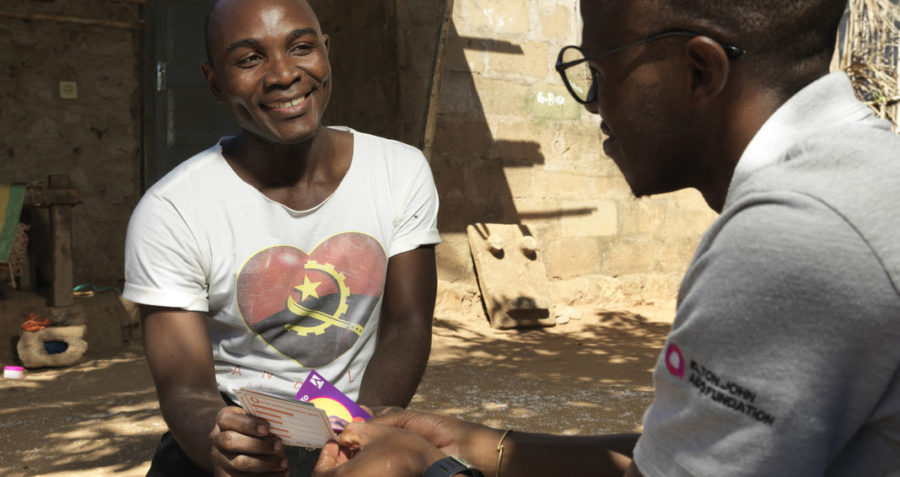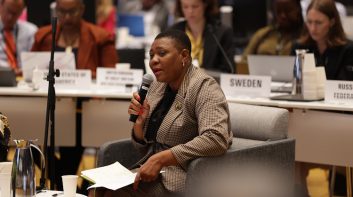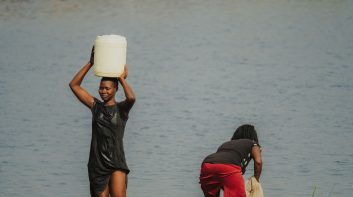Community HIV health agents reach marginalised people in Mozambique
 © Frontline AIDS/Peter Caton 2019
© Frontline AIDS/Peter Caton 2019
In Mozambique, our two-year Deep Engagement programme has changed lives with its focus on providing individualised stigma-free HIV services for LGBT people.
More than two million people are living with HIV in Mozambique yet there is next to no government support for the lesbian, gay, bisexual and transgender (LGBT) community which has been left behind in the national AIDS response.
Discrimination and stigma are commonplace and, as a result, LGBT people are often discouraged from getting tested for HIV or visiting healthcare services. Deep Engagement drew on the expertise of its consortium members to provide rapid HIV testing by trained LGBT HIV counsellors as well as outreach clinical services in locations regularly visited by LGBT people.
LAMBDA (Mozambique Association for Sexual Minority Rights) is one of the programme consortium members we worked with, and it has been advocating for the recognition of LGBT rights in the country since 2006. Its community health agents have been instrumental in supporting LGBT people living with HIV to access testing, treatment and care services.
A new start
Chaka is someone who has benefited enormously from the programme. Aged 29 and living in a suburb of Pemba, his life and health have been turned around by the personalised attention he has received.
“My childhood was not a good one,” he says. “I was in a lot of trouble and I started to get drunk, I started doing other things like sex work. My life was full of turmoil.
“The LAMBDA agent came to try to raise awareness. He said that I should get tested to know my state of health because in the places where I went, with drugs, there was a great chance of contracting HIV. The community agent gave me an explanation about HIV that made me thoughtful so I decided one day to take the test. When I did, the result was positive.”
The community health agent then coaxed Chaka to go with him to the clinic for treatment.
“From that day until today, I see that I am changed,” Chaka says. “I changed my behaviour, thanks to that intervention. I’ve stopped drinking and behaving badly. I know what my mistakes are.”
The personal touch
Luís is a health agent with LAMBDA and has seen how outreach directly to the LGBT community can really encourage individuals like Chaka to get tested for HIV, as well as support people to stay HIV-negative. The fact that he is from the community himself helps foster a sense of trust.
“I work with my target group because they used to have a problem with how to get to the health units,” Luís says. “But I go into the community, to areas where I know I can find them. They open up to me more. I can do the testing and, if they are positive, they are no longer afraid to arrive at the hospital because I am the one who takes them to the health centre. I introduce them to the providers and they are well received, and get the proper medicines.”
He adds: “The project has made a difference, changing lives and helping the LGBT community express its sexual orientation and identity as well as access health services, mainly HIV care and treatment.”
Chaka affirms how the community approach has paid dividends: “This project is helping a lot because there are advisors who are doing a good job. They speak well, they are not nervous and they do not give up on the people who they follow up.
“I get inspired by the community agent, because I like the way he behaves, I would like to be on the same path as him. He has the courage to sensitise people, I would like to have the courage that he has.”
About our programme
Funded by the Elton John AIDS Foundation, the Deep Engagement programme ran from July 2017 to April 2020 and was set up to improve access to quality, stigma-free HIV and STI prevention, care and treatment services for LGBT people in Mozambique. Frontline AIDS was the consortium lead.
Further Reading
Tags
Adolescents and young peopleDeep Engagement MozambiqueLGBTMozambique





